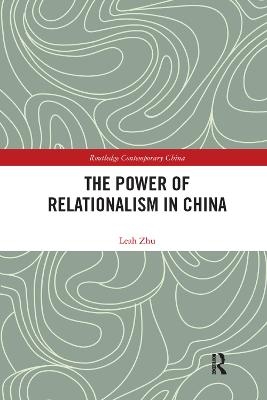
The Power of Relationalism in China
Routledge (Verlag)
978-0-367-35600-2 (ISBN)
- Titel z.Zt. nicht lieferbar
- Versandkostenfrei
- Auch auf Rechnung
- Artikel merken
In the 21st century, China has become impossible to ignore. At the same time, a vast array of perceptions and judgments of China’s actions and future have arisen. The confusion, Leah Zhu postulates, is explained by decades of traditional modus operandi, which began in the Maoist Era and misconceives China as a ‘collectivist’ culture.
This book, however, seeks to re-explore thousands of years of China’s history to demonstrate the country’s adherence to an alternative principle, ‘relationalism’. Tracing the pervasive power of ‘relationalism’ before and after Maoism, it examines the major aspects of Chinese culture, including politics, sociology, psychology and diplomacy. In doing so, it reveals the power of ‘relationalism’ as the core frame of reference behind contemporary Chinese beliefs and practices. Furthermore, armed with this newly established framework, this book ultimately provides a helpful analysis of China’s past political, economic, and judiciary reforms and of how they are faring under the control of the current regime.
Featuring extensive evidence and analysis of Chinese culture from ancient rites through to the 21st century, this book will be invaluable to students and scholars of Chinese culture, politics and society. It will also appeal to social scientists and sociologists more broadly.
Leah Zhu is a retired psychotherapist and academic at the University of Washington, USA. Her publications include A Comparative Study of Youth Mental Health Education in the United States and China (2015) and Cultivating the World of Self (1997).
Introduction Part I: The Roots of Relationalism in Chinese History 1. Some Starting points 2. The "Universal Order" 3. The Traditional Chinese Family 4. Relationalism Meets Foreign Challenges 5. Relationalism Triumphs Part II: The Roots of Relationalism in Chinese Belief systems 6. Some Starting Points 7. Confucius: Relationalism in Human Society 8. Daoism: Relationalism in the Cosmos 9. Buddhism: Relationalism in Zen 10. Unification under Relationalism Part III: " Guanxi"-- The Sociological Roots of Relationalism 11. Some Starting Points 12. Qin qing (Kinship Emotions) 13. You qing (Friendship Emotions) 14. Ren qing (Generic Human Emotions) 15. Guanxi Opens Access to Resources 16. "Face" and Reciprocity 17. "The Cat-and-Mouse Game" Part IV: The Psychological Roots of Relationalism 18. Some Starting Points 19. Relational Human Nature 20. The Chinese "Heart" 21. Cognition and Emotion 22. Relational Thinking in the Chinese Language 23. Development of "Selfhood" Part V: Relationalism in the 21st Century 24. Some starting points 25. The CCP Factional Politics in the 21st Century 26. The CCP-State Relationships in the 21st Century 27. The CCP-Chinese Society Relationships in the 21st Century 28. A Judiciary System with "Chinese Characteristics"? 29. On the World Stage: China’s Relational Diplomacy in the 21st Century Epilogue: the Chinese Family in the 21st Century
| Erscheinungsdatum | 05.06.2019 |
|---|---|
| Reihe/Serie | Routledge Contemporary China Series |
| Zusatzinfo | 1 Halftones, black and white; 1 Illustrations, black and white |
| Verlagsort | London |
| Sprache | englisch |
| Maße | 156 x 234 mm |
| Gewicht | 430 g |
| Themenwelt | Geisteswissenschaften ► Geschichte ► Allgemeines / Lexika |
| Geisteswissenschaften ► Geschichte ► Allgemeine Geschichte | |
| Geschichte ► Teilgebiete der Geschichte ► Kulturgeschichte | |
| Sozialwissenschaften ► Politik / Verwaltung ► Politische Systeme | |
| Sozialwissenschaften ► Politik / Verwaltung ► Politische Theorie | |
| ISBN-10 | 0-367-35600-7 / 0367356007 |
| ISBN-13 | 978-0-367-35600-2 / 9780367356002 |
| Zustand | Neuware |
| Haben Sie eine Frage zum Produkt? |
aus dem Bereich


